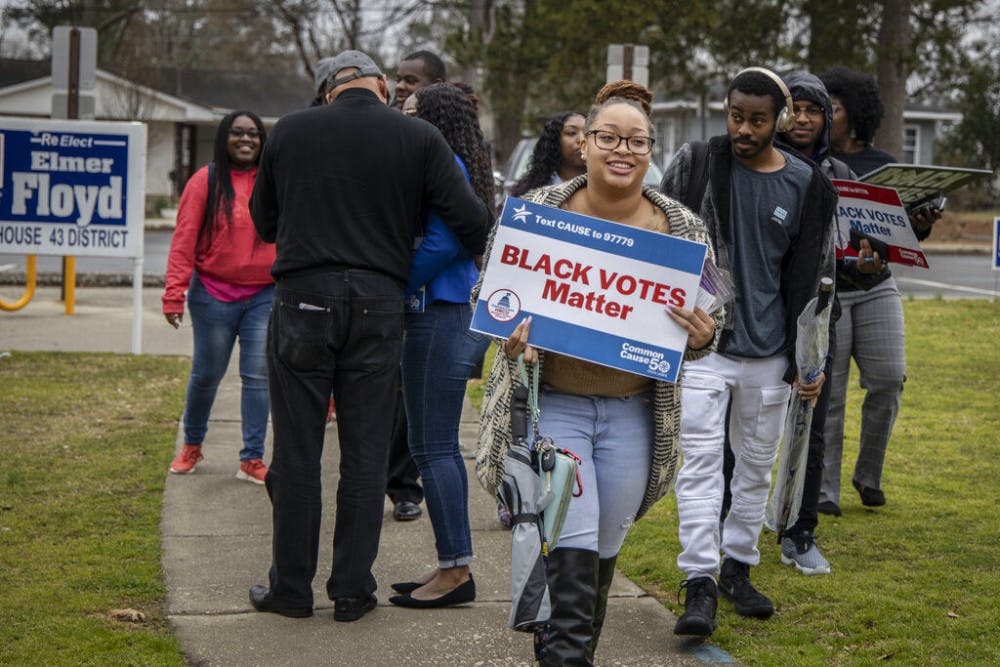When Khadijah Dabo votes, she’s voting for three people instead of one.
Dabo, the daughter of Senegalese immigrants who are unable to vote in U.S. elections, said she wasn’t necessarily raised with a “roadmap” of American politics. Rather than parties, her parents raised her on principles: to be respectful, open-minded and honest.
But when she goes to the polls, she has herself and her parents to think about.
She said these values have helped shape her political views, which have increasing importance.
“It affects them,” Dabo, a 20-year-old UF health science sophomore, said. “If they were deported, where would that put my family?”
It’s personal questions that could compel Dabo to vote more liberally or conservatively.
Eighty-four percent of black voters are either Democratic or lean toward the party, while about 8 percent at least somewhat identify as Republicans, according to the Pew Research Center.
Although black voters appeared to favor former Vice President Joe Biden on Super Tuesday, younger black voters brought a different perspective to the polls, according to The Guardian.
In search for a candidate who will address problems that specifically affect the black community, many black voters including Dabo, have aligned with Vermont Sen. Bernie Sanders for president.
Dabo said she supports Sanders because of his promise for an easier pathway to citizenship, which she hopes will benefit her Senegalese parents, who have lived in the U.S. for more than two decades.
She said her mother always talks about how difficult it is for her to find work and travel because of her immigration status.
“She loves to travel, and she’s kind of just stuck in the states,” Dabo said. “She can’t go anywhere because she wouldn’t be able to come back.”
Dabo also believes in affordable and equal access to healthcare. She trusts that Sanders’ Medicare for All plan could effectively address the racial and socioeconomic disparities experienced by the black community.
Through her studies as a health science student, she said she’s learned about how the quality of healthcare for people of color can be negatively affected by Eurocentric research, or research that focuses on white people, and doesn’t account for how healthcare could differently affect the black community, she said.
Because people of color are disproportionately in lower socioeconomic levels, they are often unequally able to get the healthcare they need.
“The healthcare system is neglecting lots of minorities and making health care access difficult,” Dabo said.
Sanders has large appeal among college students because of his goal to provide free college and cancel student debt, said Michlyne Bellas, a Haitian 20-year-old.
As a UF business administration junior, Bellas said she previously favored capitalism because she thought it was best for economic growth.
But after learning more about socialism through social organizations, she now believes that capitalism is anti-black, citing the inability for many black people to move up socially because of a lack of generational wealth stemming from slavery.
“We don’t have a lot of luck with ownership within our population,” she said, “and that can be perpetuated to the exclusion of black and brown people within the top one percent.”
In the primaries, Bellas said she will likely vote for Sanders, a self-proclaimed democratic socialist, because she believes socialism could benefit Americans in the black community who are disenfranchised.
On the other hand, Bellas’ parents plan to vote for Biden.
“They are looking for someone who can promote stability, someone who can actually get stuff done,” she said.
Bellas said that while her parents don’t support socialism because they associate it with an unstable government, she believes her experience as a college student has allowed her to become more educated on its benefits.
Even though she already has an idea of who she’s voting for, Bellas still wants to be more informed before casting her ballot at the end of the week.
To do this, she said she planned to attend a town hall hosted by UF’s Black Student Union on Wednesday, which will help educate attendees on the 2020 presidential candidates.
“I don’t want to be a one-issue voter,” Bellas said. “I’m trying to be the most educated voter possible.”
Contact Samantha Chery at schery@alligator.org. Follow her on Twitter @SammyChery4276.
Fayetteville State University students and members of the Black Voters Matter organization at the Smith Recreation Center polling site in Fayetteville, N.C., on Tuesday, March 3, 2020. Fayetteville State students were there to vote in North Carolina's Super Tuesday primaries. (Paul Woolverton/The Fayetteville Observer via AP)






